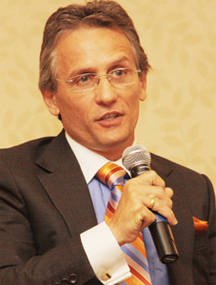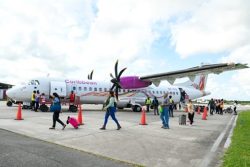When Doral made history by becoming the first Florida city to elect a Venezuelan mayor earlier this week, my first reaction was to run to my Twitter page to spread the news alongside a short comment: Gracias, Hugo!
Just as Florida should extend eternal gratitude to Cuba’s dictator, Fidel Castro, for the tens of thousands of middle-class professionals who fled to Miami after the 1959 Cuban revolution, Florida authorities should erect a statue to Venezuelan President Hugo Chávez for triggering the flight of a good chunk of Venezuela’s middle class over the past decade.
 There are an estimated 244,000 Venezuelans living in the United States, up from about 91,000 in 2000, a year after Chávez took office, according to US Census figures. Doral has the largest concentration of Venezuelans in the United States, prompting many of its residents to refer to it jokingly as ‘Doralzuela.‘
There are an estimated 244,000 Venezuelans living in the United States, up from about 91,000 in 2000, a year after Chávez took office, according to US Census figures. Doral has the largest concentration of Venezuelans in the United States, prompting many of its residents to refer to it jokingly as ‘Doralzuela.‘
Perhaps more interestingly, a majority of Venezuelans in the United States are highly educated. Among Venezuelan-American residents aged 25 to 34, nearly 57 per cent have bachelor’s or master’s degrees, much more than the US national average, according to the 2010 Census figures.

While some Venezuelans came before Chávez was first elected, many have reached top positions in the US academic world. Ironically, while not one single Venezuelan university is currently listed in the Times Higher Education Supplement ranking of the world’s best 400 universities, a Venezuelan academic — Rafael Reif — was appointed earlier this year as president of the Massachusetts Institute of Technology, one of the world’s five highest-ranked universities. Many other Venezuelans are teaching at Harvard, Columbia and other top US schools.
The mass exodus of middle-class and professional Venezuelans in recent years also has been a boon to Miami’s real estate industry. Venezuelans, as well as Brazilians and Argentines, have been among the main buyers of houses and apartments following the 2008 housing crisis.
Not surprisingly, a recent Miami Herald story quoted Philip Spiegelman, principal of the International Sales Group, a Miami condominium marketing firm, as saying that the joke of the day at a November 15 real estate conference in Miami was that Chávez should be named “Salesman of the Year” because of the high numbers of Venezuelans who purchased real estate in Miami this year.
In a telephone interview, Luigi Boria, Doral’s new mayor, told me that Venezuelans make up about 22 per cent of Doral’s residents.
Boria, a businessman who owns a computer export firm, moved to Florida in 1989, but most Venezuelan residents of Doral arrived more recently.
“They have come because of the persecution, the fear and insecurity they feel in Venezuela,” Boria says.
“And many more are likely to come in the near future. My own brother and his family are talking with immigration attorneys and trying to move here.”
Much the same exodus of middle and upper-class Venezuelans is aimed toward Panama, Colombia, and other Latin American countries, where the Venezuelan diaspora is growing by the day. There are at least 97,000 Venezuelans living in Spain, 37,000 in Italy and 36,000 in Portugal, according to the Paris-based Organization for Economic Cooperation and Development.
As a result of the flight of Venezuelan oil executives and engineers, Venezuela’s oil production has plummeted from 3.4 million barrels a day when Chávez took office to about 2.5 million barrels today, according to independent industry estimates.
Much like what happened with Cuba’s sugar industry after the 1959 Cuban Revolution, Venezuela’s oil industry has been decimated by the outflow of human capital.
My opinion: Venezuela’s populist fiesta — in which Chávez has won reelection thanks to giving away his country’s oil bonanza in cash subsidies to millions of people, while at the same time destroying the economy and killing the country’s industries — is resulting in a mass exodus of talented professionals. The trend will haunt Venezuela for years to come.
But for the United States, Spain, Panama and other countries that are receiving this pool of highly-skilled and often wealthy immigrants, it’s a blessing.
President Barack Obama could use the occasion of Boria’s election as the first Venezuelan-born mayor in Florida to send a heartfelt “thank-you” note to Chávez.
© The Miami Herald, 2012. Distributed by Knight Ridder/ Tribune Media Services.





